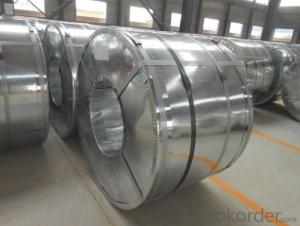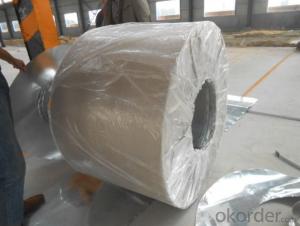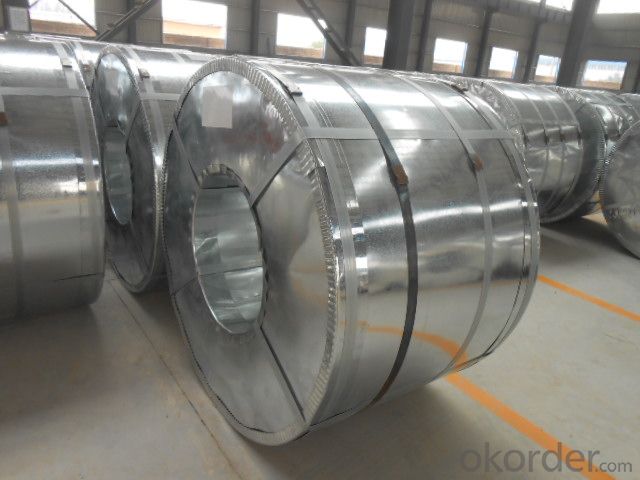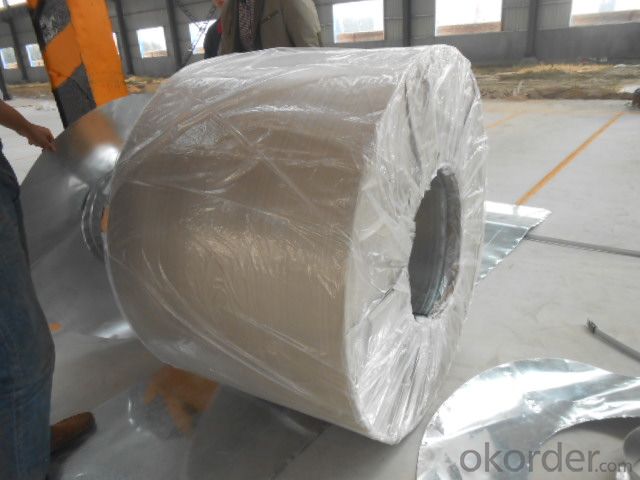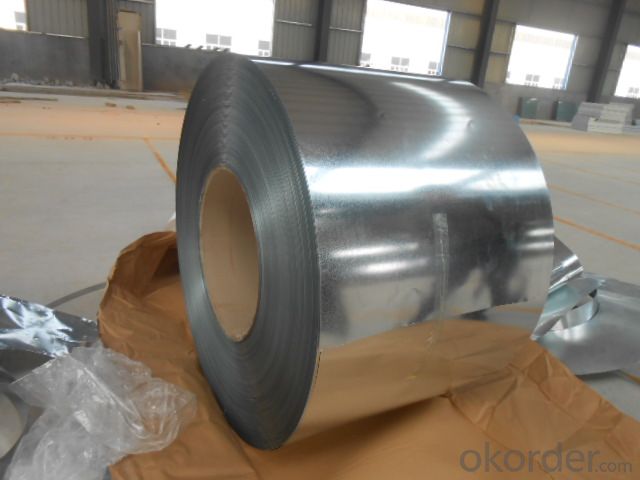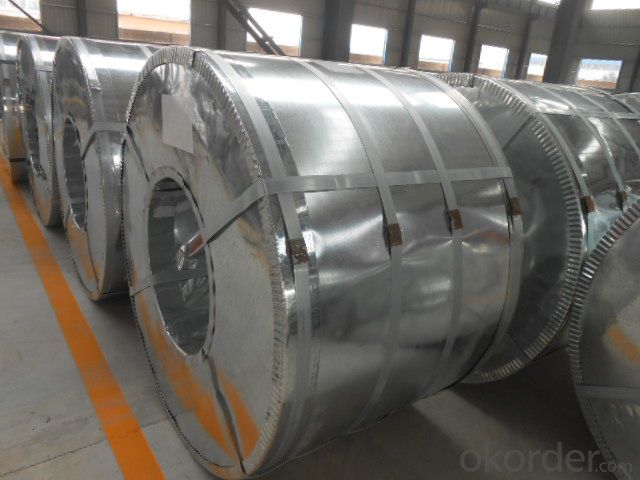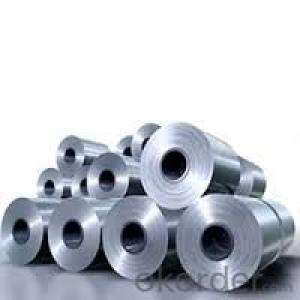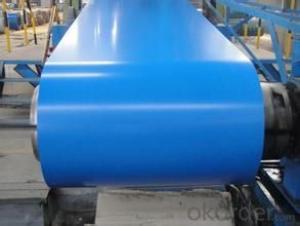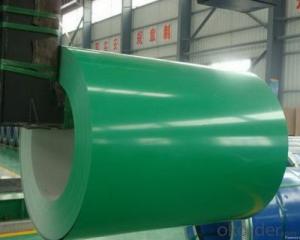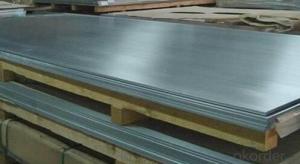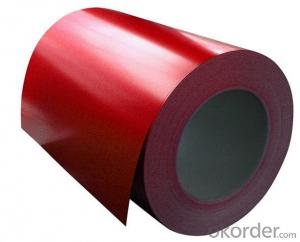Prime Galvanized steel coil zinc coating 120g/m2
- Loading Port:
- Tianjin
- Payment Terms:
- TT OR LC
- Min Order Qty:
- 100 m.t.
- Supply Capability:
- 10000 m.t./month
OKorder Service Pledge
OKorder Financial Service
You Might Also Like
Prime Galvanized steel coil
Packaging & Delivery
Packaging Detail: seaworthy export package
Delivery Detail: on request
Specifications
1. more than 10 years’ experience on this field
2. advanced equipments
3. competitive price
4. soonest delivery
Product Description :
Commodity
Hot dip galvanized steel coil
Technical Standard: JIS 3302 / ASTM A653 / EN10143/ GB/T 2518
Grade:DX51D/ S250,280,320GD,SGCC,SGHC,SGH340,SGH400,SGH440,G450,G550
Types:Commercial / Drawing / Deep Drawing / Structural quality
Width: 900mm/1000mm/1219mm/1200mm/1220mm/1250mm
Thickness: 0.2mm~4.0mm
Type of coating: galvanized
Zinc coating: Z40-275g/m2,Z40-Z450g/m2
Surface treatment: zero spangle / regular spangle/ big spangle
ID coil: 508mm or 610mm
Coil weight: 3-10/MT per coil
Package: Properly packed for ocean freight exportation in 20''container
Application:: home appliances, constructions, building, machineries
Our Advantages :
1. Expertise:
More than 10 years of manufacture: we know how to properly handle every step of production.
2. Competitive price:
We can offer competitive prices to our customers.
3. Accuracy:
We have excellent technicians and leaders, which can ensure our products are exactly what you want.
4. Materials:
All galvanized steel coils are made of high-quality raw materials.
5. Certificate:
Our products are certified by ISO9001.
6. Productivity:
We have large-scales of production lines,, which can guarantee all your orders will be finished in earliest time.
Hr CGL Technical Process:
Coil loading-> uncoiling-> cutting-> welding-> entry accumulator-> Heating and deoxidization-> galvanizing-> air cooling->water quenching-> air dryer-> tension leveler-> Passivation->air dryer->exit accumulator-> oiling-> cutting-> recoiling->coil unloading-> packing
The furnace heating style: improved Sendzimir heating technology
Hourly output: max.76.3t/h
Process after coating: tension leveling, Passivation or oiling
Our Service
Our quality
Test Equipments of Prepainted Galvanized Steel Coil : Salt-spray tester; Atomic absorption spectrophotometer; Rockwell typer hardness tester; Tensile test machine; Metrohm titration; Laboratory Bend test machine.
Our packing
Properly packed for ocean freight exportation in 20''container, galvanized metal fluted rings on inner and outer edges, galvanized metal & waterproof paper wall protection disk, galvanized metal & waterproof paper around circumference.
R&D department
R&D department concentrates on researching and developing reliable products with best quality. The quality department test and control every process of production to guarantee the best quality of product
- Q: How are steel coils used in the production of metal enclosures?
- Due to their versatility and strength, steel coils find extensive use in the manufacturing of metal enclosures. Typically made from high-quality steel, these coils serve as the primary raw material for producing metal enclosures. To begin with, specialized machinery is employed to unroll and flatten the steel coils to the desired thickness. This step ensures that the coils are suitable for further processing. Subsequently, the flattened steel is cut into specific sizes and shapes, according to the design requirements of the metal enclosure. Following this, various techniques such as bending, folding, and welding are utilized to mold the cut steel pieces into the desired shape. These processes enable the steel to be formed into the required dimensions and structure of the metal enclosure. The inherent strength and durability of the steel coils ensure that the final product is robust and capable of withstanding external forces or impacts. Moreover, steel coils can be coated with protective layers such as galvanization or powder coating to enhance their resistance to corrosion, rust, and other environmental factors. This coating helps to extend the lifespan of the metal enclosure while maintaining its aesthetic appeal. Furthermore, the use of steel coils in the production of metal enclosures allows for customization and flexibility. The coils can be easily manipulated to create complex shapes or designs, facilitating the customization of enclosures to meet specific customer requirements. This adaptability makes steel coils a preferred choice in industries such as automotive, electronics, and construction, where metal enclosures are widely used. In conclusion, steel coils are essential in the manufacturing of metal enclosures as they provide a strong and versatile raw material. These coils are transformed into the desired shape and size, ensuring the durability and functionality of the enclosures. With their customizable nature and protective coatings, steel coils offer a cost-effective solution for producing high-quality metal enclosures.
- Q: Is steel easier to weld?Which is more brittle/less flexible?
- I can't weld steel to aluminum, and generally speaking I'd say the answer is no, however, there are some special procedures that can make a metallic bond between steel and aluminum, it can be done with explosive welding. A lot of multi-ply cookware is made with aluminum sandwiched between stainless steel, there is so much of it that I imagine there is another way besides explosives, but I don't know what. In any case it is not a normal workshop procedure. Steel is often considerably easier to weld, but it depends on the alloy. some steels are difficult to weld and some aluminum alloys are fairly easy, but on the average steel is easier. as far as brittle/ flexible it again depend on the alloy, some steels are less brittle than some aluminum alloys and the other way around. Steel does have a higher modulus of elasticity, so for a given size steel is stiffer, but that is for elastic deformation, for plastic deformation steel often has a higher yield strength, but some of the more exotic aluminum alloys can be stronger than low grades of steel.
- Q: How do steel coils contribute to the manufacturing of household appliances?
- Household appliances rely heavily on steel coils, which are essential for their production. These coils, crafted from high-quality steel, are vital in providing the necessary strength and durability needed for manufacturing various appliances. One key application of steel coils in household appliances is their use in constructing the appliance's body or frame. These coils are shaped and molded into the desired structure, creating a robust foundation for the appliance. This ensures that the appliance can endure daily usage and remain intact for an extended period of time. Furthermore, steel coils are also employed in manufacturing different components within household appliances. For instance, refrigerators and air conditioners utilize steel coils in their condenser and evaporator coils, which are responsible for the heat exchange process. These coils enable efficient cooling or heating, guaranteeing optimal performance of the appliance. Moreover, steel coils find application in producing appliance interiors, such as oven racks, dishwasher baskets, and laundry machine drums. The strength and resistance provided by the steel coils help these components withstand heavy loads and repeated use, enhancing the overall longevity and reliability of the appliance. Additionally, steel coils contribute to the aesthetic appeal of household appliances. They can be shaped, molded, and coated to achieve various finishes, colors, and textures, enhancing the visual attractiveness of the appliance and making it more appealing to consumers. In conclusion, steel coils are indispensable in the manufacturing of household appliances as they provide strength, durability, and resilience to the structure, components, and interiors of these appliances. They play a crucial role in ensuring the performance, reliability, and longevity of these appliances, making them an integral part of the manufacturing process.
- Q: What are the advantages of using steel coils in the manufacturing industry?
- There are several advantages of using steel coils in the manufacturing industry: 1. Strength and Durability: Steel coils are known for their high strength and durability, making them ideal for various manufacturing processes. They can withstand heavy loads and resist deformation, ensuring that the final product is reliable and long-lasting. 2. Versatility: Steel coils can be used in a wide range of applications across different industries. They are highly versatile and can be shaped, molded, or cut into different forms and sizes, making them suitable for diverse manufacturing needs. 3. Cost-effective: Steel coils are a cost-effective option for the manufacturing industry. Due to their strength and durability, they have a longer lifespan compared to other materials, reducing the need for frequent replacements. This leads to cost savings in the long run. 4. Excellent Thermal Conductivity: Steel has excellent thermal conductivity, meaning it can efficiently transfer heat. This makes steel coils suitable for applications that require temperature regulation, such as in the automotive and HVAC industries. 5. Recyclability: Steel is one of the most recycled materials globally. By using steel coils in the manufacturing process, companies contribute to a more sustainable and eco-friendly approach. Recycling steel reduces the need for raw materials extraction and energy consumption, resulting in a reduced carbon footprint. 6. Corrosion Resistance: Steel coils can be coated with protective layers, such as galvanization or anti-corrosion treatments, to enhance their resistance to rust and corrosion. This makes them suitable for outdoor applications or industries with corrosive environments. 7. Consistency and Quality: Steel coils offer consistent quality and uniformity in terms of dimensions, mechanical properties, and surface finish. This ensures that the end products meet the required specifications and maintain a high level of quality. In summary, the advantages of using steel coils in the manufacturing industry include their strength, durability, versatility, cost-effectiveness, excellent thermal conductivity, recyclability, corrosion resistance, and consistent quality. These benefits make steel coils a popular choice for various manufacturing processes across different industries.
- Q: What are the various surface finishes available for steel coils?
- Steel coils offer a range of surface finishes, each with its own properties and uses. Some commonly used finishes include: 1. Hot rolled: Steel is rolled at high temperatures, resulting in a rough surface. This finish is great for structural applications like construction materials and industrial machinery. 2. Cold rolled: Steel is rolled at room temperature, creating a smoother surface. It is commonly used in automotive and appliance manufacturing due to its superior finish and accuracy. 3. Galvanized: Steel is coated with zinc to protect against corrosion. Galvanized coils have a shiny appearance and are suitable for outdoor applications such as roofing and fences. 4. Electro-galvanized: Coated with a thinner layer of zinc through an electroplating process, these coils offer good corrosion resistance. They are commonly used in electrical appliances, automotive parts, and construction. 5. Pre-painted: Coated with paint or polymer film, pre-painted coils provide both corrosion protection and aesthetic appeal. They are extensively used in construction for roofing, cladding, and wall panels. 6. Stainless steel: Stainless steel coils have unique properties, including corrosion resistance, heat resistance, and chemical damage resistance. They are ideal for industries like food processing, medical equipment, and marine applications. These examples showcase the variety of surface finishes available for steel coils. The choice of finish depends on factors such as the intended use, desired appearance, and level of corrosion resistance required.
- Q: I have a white gold engagement ring, and to be special I thought I'd get a plain band from Tiffany's--in stainless steel. Can stainless steel be worn with white gold or will there be a difference in the color or texture? I'm not planning on getting them soldered together, but I don't want it to be noticeable that they are different metals. Does anyone have experience in this subject?
- Stainless Steel Matching Wedding Bands
- Q: I beat fallout 3 and i downloaded broken steel expansion. I have no idea how to get to broken steel in other words i do not know how to start playing it.
- after-wards you will have to sit through the end movie, which I felt was longer than the original, then the broken steel part will start, which I wont ruin. If your still having problems, go into your DLC and delete broken steel, and re-install it.
- Q: I would like to build steel galvanization plant.
- How big of a kettle do you want to go with? A small 6-10 foot kettle would work fine for spinner work (small parts ran in baskets) but if you want to handle large beams and so forth you will need to have at least a 25 foot or longer kettle. You will need tanks for caustic,acid,rinsing,and preflux solutions. If you go with sulfuric acid it will have to be heated. The caustic and flux tanks need to be heated in any case.You will also need a bag house to control smoke coming off the kettle. First you should look into permits such to see if you can actually build this plant. Galvanizing is nasty work and the laws and regs are strict. Former Kettleman
- Q: What are the benefits of using steel coils in the manufacturing of pipes?
- There are several benefits of using steel coils in the manufacturing of pipes: 1. Strength and durability: Steel is known for its strength and durability, making it an ideal material for pipes. Steel coils provide a strong foundation for pipes, ensuring they can withstand high-pressure applications and resist damage from external factors such as impact or corrosion. This strength and durability enhance the longevity of the pipes, reducing the need for frequent replacements. 2. Flexibility: Steel coils offer flexibility in terms of customization and design. They can be easily formed into various pipe shapes and sizes, allowing manufacturers to produce pipes that meet specific project requirements. This flexibility also enables the production of seamless pipes, which have superior structural integrity and reduced risk of leakage. 3. Thermal resistance: Steel has excellent thermal conductivity, meaning it can efficiently transfer heat or cold. This property is crucial for pipes used in industries such as oil and gas, where temperature control is essential. Steel coils enable the manufacturing of pipes that can effectively handle extreme temperatures, preventing any damage to the pipes or the substances flowing through them. 4. Cost-effectiveness: Steel coils can be produced in large quantities, resulting in economies of scale and lower production costs. This cost-effectiveness is beneficial for both manufacturers and consumers, as it helps keep the overall cost of pipes down. Additionally, the durability of steel pipes reduces the need for frequent repairs or replacements, saving money in the long run. 5. Corrosion resistance: Steel coils can be coated with protective layers to enhance their resistance to corrosion. This corrosion resistance is crucial in applications where pipes come into contact with corrosive substances or are exposed to harsh environmental conditions. By using steel coils with appropriate coatings, manufacturers can ensure that their pipes have a longer lifespan and maintain their structural integrity under challenging circumstances. Overall, the use of steel coils in pipe manufacturing offers numerous advantages, including strength, flexibility, thermal resistance, cost-effectiveness, and corrosion resistance. These benefits make steel coils a preferred choice for many industries that rely on durable and efficient piping systems.
- Q: What are the common defects found in uncoiled steel coils?
- Some common defects found in uncoiled steel coils include surface defects such as scratches, dents, and rusting, as well as dimensional defects like coil width variation, edge waviness, and coil set. Other defects may include coil breaks, oil spots, and uneven winding tension.
Send your message to us
Prime Galvanized steel coil zinc coating 120g/m2
- Loading Port:
- Tianjin
- Payment Terms:
- TT OR LC
- Min Order Qty:
- 100 m.t.
- Supply Capability:
- 10000 m.t./month
OKorder Service Pledge
OKorder Financial Service
Similar products
Hot products
Hot Searches
Related keywords
